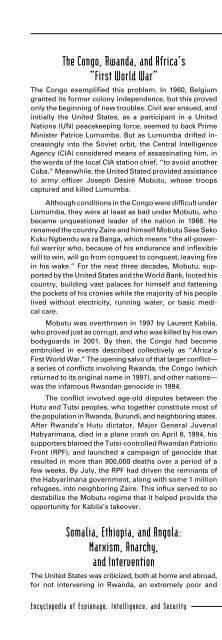ENCYCLOPEDIA OF Espionage, Intelligence, and Security Volume ...
ENCYCLOPEDIA OF Espionage, Intelligence, and Security Volume ...
ENCYCLOPEDIA OF Espionage, Intelligence, and Security Volume ...
You also want an ePaper? Increase the reach of your titles
YUMPU automatically turns print PDFs into web optimized ePapers that Google loves.
Africa, Modern U.S. <strong>Security</strong> Policy <strong>and</strong> InterventionsThe Congo, Rw<strong>and</strong>a, <strong>and</strong> Africa’s“First World War”The Congo exemplified this problem. In 1960, Belgiumgranted its former colony independence, but this provedonly the beginning of new troubles. Civil war ensued, <strong>and</strong>initially the United States, as a participant in a UnitedNations (UN) peacekeeping force, seemed to back PrimeMinister Patrice Lumumba. But as Lumumba drifted increasinglyinto the Soviet orbit, the Central <strong>Intelligence</strong>Agency (CIA) considered means of assassinating him, inthe words of the local CIA station chief, “to avoid anotherCuba.” Meanwhile, the United Stated provided assistanceto army officer Joseph Désiré Mobutu, whose troopscaptured <strong>and</strong> killed Lumumba.Although conditions in the Congo were difficult underLumumba, they were at least as bad under Mobutu, whobecame unquestioned leader of the nation in 1966. Herenamed the country Zaire <strong>and</strong> himself Mobutu Sese SekoKuku Ngbendu wa za Banga, which means “the all-powerfulwarrior who, because of his endurance <strong>and</strong> inflexiblewill to win, will go from conquest to conquest, leaving firein his wake.” For the next three decades, Mobutu, supportedby the United States <strong>and</strong> the World Bank, looted hiscountry, building vast palaces for himself <strong>and</strong> fatteningthe pockets of his cronies while the majority of his peoplelived without electricity, running water, or basic medicalcare.Mobutu was overthrown in 1997 by Laurent Kabila,who proved just as corrupt, <strong>and</strong> who was killed by his ownbodyguards in 2001. By then, the Congo had becomeembroiled in events described collectively as “Africa’sFirst World War.” The opening salvo of that larger conflict—a series of conflicts involving Rw<strong>and</strong>a, the Congo (whichreturned to its original name in 1997), <strong>and</strong> other nations—was the infamous Rw<strong>and</strong>an genocide in 1994.The conflict involved age-old disputes between theHutu <strong>and</strong> Tutsi peoples, who together constitute most ofthe population in Rw<strong>and</strong>a, Burundi, <strong>and</strong> neighboring states.After Rw<strong>and</strong>a’s Hutu dictator, Major General JuvenalHabyarimana, died in a plane crash on April 6, 1994, hissupporters blamed the Tutsi-controlled Rw<strong>and</strong>an PatrioticFront (RPF), <strong>and</strong> launched a campaign of genocide thatresulted in more than 800,000 deaths over a period of afew weeks. By July, the RPF had driven the remnants ofthe Habyarimana government, along with some 1 millionrefugees, into neighboring Zaire. This influx served to sodestabilize the Mobutu regime that it helped provide theopportunity for Kabila’s takeover.Somalia, Ethiopia, <strong>and</strong> Angola:Marxism, Anarchy,<strong>and</strong> InterventionThe United States was criticized, both at home <strong>and</strong> abroad,for not intervening in Rw<strong>and</strong>a, an extremely poor <strong>and</strong>Encyclopedia of <strong>Espionage</strong>, <strong>Intelligence</strong>, <strong>and</strong> <strong>Security</strong>l<strong>and</strong>locked nation with almost no strategic importance toWashington. It is possible that had America intervened, itwould have been condemned for interfering in other nations’internal affairs. Such was the case in Somalia just afew months earlier, when U.S. attempts to provide humanitarianassistance so inflamed resentment that evenafter the terrorist attacks of September, 2001, Muslimcritics of U.S. policy would cite Somalia as an example ofAmerican imperialism.Located on the horn of Africa, Somalia also achievedits independence in 1960, <strong>and</strong> also succumbed to dictatorship,in this case under Major General Mohamed SiadBarre. After overthrowing the government in 1969, SiadBarre launched the country on a disastrous experiment inSoviet-style socialism, complete with posters in the capitalcity of Mogadishu that featured his face alongsidethose of Karl Marx <strong>and</strong> V. I. Lenin. In a country where theprincipal form of organization is by clan, modern politicalforms of any kind were foreign, <strong>and</strong> it would have beendifficult to find a more inadequate prescription for Somalia’schallenges than Siad Barre’s Marxist Leninism.Ironically, the takeover of neighboring Ethiopia byCommunists in 1974 proved Siad Barre’s undoing. In thechaos that befell Ethiopia after the downfall of longtimeemperor Haile Selassie, Somalia went to war with itsneighbor over the Ogaden Desert, <strong>and</strong> by September,1977, had all but won. At that point, however, the Sovietsswitched their allegiance to Ethiopia’s Marxist government.The Soviets’ change of allegiance created a strangealliance between Siad Barre <strong>and</strong> the United States. Theproxy war in the Horn of Africa nearly became an entanglementinvolving U.S. troops, as Zbigniew Brzezinski,National <strong>Security</strong> Advisor under President James E. Carter,briefly considered deploying the U.S. carrier Kitty Hawk tothe region in March 1978. The United States <strong>and</strong> Somaliaconcluded military agreements in 1980 that allowed U.S.access to naval ports at Mogadishu <strong>and</strong> other cities.The military alliance with the United States did notresult in any meaningful changes in Siad Barre’s style ofrule, <strong>and</strong> over the next decade, his influence slowly declineduntil he was ousted in 1991. By then, with the ColdWar all but finished, the United States—which had strategicnaval bases farther south in Kenya—had no particularinterest in preventing Somalia from sliding toward anarchy.Then, in 1992, during the last weeks of his administration,President George H. W. Bush committed 25,000 U.S.troops to a UN force involved in distributing famine reliefsupplies.Bush was influenced by the fact that the UN hadperformed well during the crises surrounding the PersianGulf War of 1990–91, but the experience in Somalia wasnot to be as successful. By 1993, U.S. forces had becomecaught in the middle of conflicts between local warlords,<strong>and</strong> on October 3, 18 U.S. Rangers were killed in a firefighton the streets of Mogadishu. Prior to this debacle, Secretaryof Defense Les Aspin had outlined an agenda of7







![The Big Lie 9-11 and Government Complicity in Mass Murder [PDF]](https://img.yumpu.com/50957077/1/190x245/the-big-lie-9-11-and-government-complicity-in-mass-murder-pdf.jpg?quality=85)








